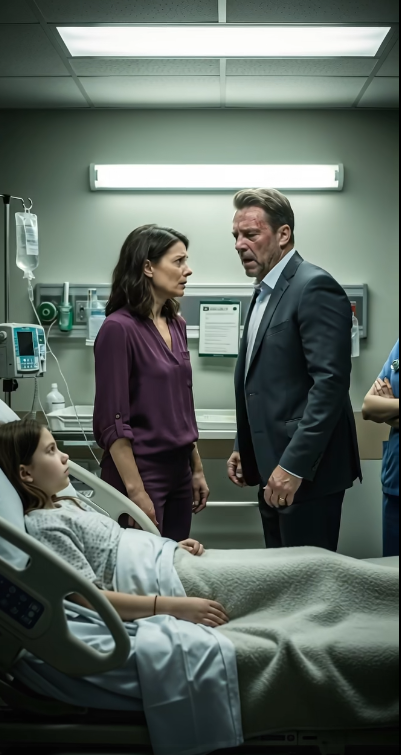The cherry blossoms exploded in a riot of pink and white across the Seattle suburbs, a beautiful lie that promised new beginnings. Inside her pristine kitchen, Sarah Johnson felt anything but new. A strange quiet had settled in their home over the past few months, a silence that clung to the corners and made the cheerful morning sunlight feel like an intruder. While the coffee maker gurgled, her thoughts were a tangled mess of her daughter’s upcoming school presentation and a deeper, more formless anxiety she couldn’t name.
At the local hospital, they called her the “angel nurse.” Her calm demeanor and gentle touch were a balm to the sick and the scared. She could soothe a frightened child or hold the hand of a dying patient with equal grace. Yet, she couldn’t seem to heal the creeping ailment infecting her own family.
“Mom, I’m nervous about the math test,” ten-year-old Emma said, scampering down the stairs, her golden curls bouncing. She was a brilliant, bubbly child, the sun around which Sarah’s world orbited.
“You’ll be fine, sweetie. We practiced all night,” Sarah said, her smile practiced as she spread jam on toast. It was a perfect domestic scene, but the third chair at the table was already empty.
“Has Daddy left already?” Emma asked, her bright eyes scanning the room.
“He had a big meeting, honey. But he promised he’d be at your presentation this afternoon,” Sarah replied, the words tasting like ash. Her husband, Michael, a successful salesman, had become a ghost in his own home. The late nights, the constant, hushed phone calls, the weekend work trips that seemed to multiply—each was another brick in the wall he was building between them. He used to be the father who coached Emma’s softball team, the husband who planned surprise picnics. Now, his phone was his closest companion, its blue light a constant barrier.
“Hannah’s birthday party is today. Can I go?” Emma asked, a milk mustache on her upper lip.
“Of course, but homework first,” Sarah said, her voice a little too bright.
Driving Emma to school, Sarah’s professional instincts warred with her maternal denial. For weeks, Emma had been picking at her food. She complained of headaches and a weariness that didn’t belong in a ten-year-old’s body.
“How are you really feeling, Emma? You haven’t had much of an appetite,” Sarah asked, her eyes flicking to her daughter in the rearview mirror.
“I’m fine, Mom. Just… tired,” Emma mumbled, staring out the window. The usual energy in her voice was gone, replaced by a fragile listlessness that terrified Sarah. She dropped Emma off with a kiss and a forced smile, watching her daughter’s small figure disappear into the school building. The gap between them—between all of them—felt wider than ever.
That evening, Michael came home well past nine, looking drained. He bypassed the living room, where Emma was quietly doing homework, and headed for the kitchen, his phone already pressed to his ear.
“Welcome home,” Sarah said, her voice flat. “Dinner’s cold, but I can reheat it.”
“Thanks, but I grabbed something at the office,” he said, his attention still glued to the screen. The easy conversation that once filled their evenings had evaporated, replaced by this sterile, transactional silence. He was a stranger living in her house.
Later, Sarah tucked a sleeping Emma into bed, her daughter’s face serene in the dim light. She felt a fierce, primal urge to protect this small, fragile peace. In her own room, she watched Michael’s sleeping form. This was the man she had loved for twelve years, but a subtle poison had seeped into their marriage, and her intuition screamed that the worst was yet to come.
Weeks bled into a miserable month. Michael’s business trips became a weekly ritual. He announced a three-day trip to Portland over a rushed breakfast, not even looking up from his phone.
“You remember Emma’s parent-teacher conference is on Friday, don’t you?” Sarah asked, her voice barely a whisper.
“Oh, right. But this contract is critical, Sarah. You can handle it, can’t you?” His tone was dismissive, impatient. The man who once moved mountains to attend a school play now saw his daughter’s life as an inconvenience. Emma sat between them, a silent witness to their slow-motion collapse, her eyes wide with a loneliness that broke Sarah’s heart.
At the hospital, Sarah confessed her worries to her colleague, Linda. “He’s just so busy,” she said, trying to convince herself as much as her friend. “It’s just work stress. It’ll get better.” But she didn’t believe it.
Emma’s health continued to decline. She was paler, thinner. Dinner became a nightly battle of coaxing her to eat just one more bite.
“My stomach hurts a little,” she’d say, pushing her plate away. Sarah checked for a fever, but there was none. It was a phantom illness, an invisible weight pressing down on her daughter. Finally, she could ignore it no longer and took Emma to see Dr. Williams, their family pediatrician.
“There’s been some loss of appetite, headaches?” Dr. Williams asked gently after examining Emma. “Has anything changed at home recently? Children are barometers for the emotional weather in a family.”
The question struck Sarah like a physical blow. “My husband’s work… we haven’t had as much family time.”
“Emma is a sensitive girl,” the doctor said kindly. “She’s likely picking up on the tension. We’ll run some blood tests just to be safe, but I suspect this may be stress-related.”
That night, Sarah confronted Michael. “I took Emma to the doctor. He thinks she’s suffering from stress because of the changes at home.”
“Changes? Nothing’s changed,” Michael scoffed, not looking up from his phone.
“You’re never here, Michael! She misses her father!”
“It’s work, Sarah! It can’t be helped. I’m doing this for our family!” he shot back, his voice cold and sharp.
“Are you?” she asked quietly. “Because it feels like you’re tearing it apart.”
The blood tests came back clean, a result that brought no relief. Emma’s symptoms worsened. The school nurse started calling twice a week. “Mrs. Johnson, Emma’s feeling dizzy again. Can you come pick her up?” Each call was a fresh wave of guilt and fear.
“Michael, please,” Sarah begged one evening, her voice cracking. “Her condition isn’t improving. She needs her father. I can’t do this alone.”
He finally looked at her, his eyes hard. “You’re a nurse, Sarah. You’re good at taking care of children, aren’t you?”
The cruelty of his words stole her breath. It wasn’t just neglect; it was abdication. He was placing the full weight of their daughter’s health, their family’s survival, squarely on her shoulders.
The call came on a Tuesday afternoon. Sarah was in the pediatric ward when her phone buzzed with the school’s number. It was the head nurse, Mrs. Patterson, and her voice was tight with panic.
“Mrs. Johnson, you need to come immediately. Emma collapsed in the classroom. She’s conscious, but she’s very unwell. We think she needs to go to the hospital.”
The world tilted. Sarah dropped a blood pressure cuff, her colleagues rushing to her side as she explained in a choked voice. She drove to the school in a blur of terror. Emma was lying on a cot in the nurse’s office, her skin a ghastly, translucent white.
“Mom,” she whispered, her voice a thread.
“I’m here, baby. We’re going to the hospital,” Sarah said, scooping her daughter into her arms. Emma felt terrifyingly light.
At the St. Mary’s emergency room, the familiar, controlled chaos swirled around them. Sarah, the nurse, watched as her colleagues, the professionals, took over. They put Emma in a wheelchair, wheeled her into a triage room, and began their work.
“Her blood pressure is low, pulse is thready,” Dr. Martinez ordered. “Let’s get a full panel, start an IV.”
“Mom, I’m scared,” Emma whimpered, her small hand gripping Sarah’s.
“I’m right here,” Sarah promised, her heart hammering against her ribs. She tried Michael’s number. Voicemail. “Michael, it’s Emma. She’s in the hospital. Get here now.”
An hour later, Dr. Martinez returned, his expression grim. “Mrs. Johnson, the initial results are… abnormal. We’ve found a substance in her blood that shouldn’t be there. It appears to be some kind of toxic agent.”
The words didn’t make sense. “Toxic? What do you mean?”
“We need to run a more detailed analysis, but we have to consider the possibility of poisoning. And as a precaution, we have to notify the police.”
Police? The room began to spin. At that moment, Nurse Jenny rushed in. “Sarah, call your husband. You need to get him here. Right now.”
Trembling, Sarah dialed Michael again. This time, he answered. “Sarah, what is it?”
“Get to St. Mary’s. Now. They think… they think Emma’s been poisoned.”
There was a dead, hollow silence on the other end of the line. “Poisoned? What are you talking about?”
“Just come!” she screamed, hanging up.
Michael arrived thirty minutes later, his face ashen, his usual composure shattered. He and Sarah stood helplessly as two detectives entered the room. The lead, a woman named Detective Brown, had kind eyes but a firm voice.
“Mr. and Mrs. Johnson,” she began, “has Emma come into contact with anyone new recently? Anyone who might have given her food or drink?”
Sarah’s mind raced, coming up empty. “Just school friends, neighbors… no one unusual.”
Then, a small, weak voice cut through the sterile air. “Mom?”
Sarah rushed to Emma’s side. “What is it, sweetie?”
Emma’s voice was tired but clear. “Dad’s friend. The woman. She was nice… she always gave me sweets.”
The air in the room turned to ice. Every eye swiveled to Michael. He flinched, refusing to meet Sarah’s gaze.
“Emma,” Detective Brown asked gently, “when did you meet this woman?”
“Last Saturday. And the weekend before. When I was with Dad.”
The lie hit Sarah with the force of a physical blow. On those Saturdays, Michael had claimed to be at the office.
“Mr. Johnson,” the detective’s voice was steel. “Perhaps you’d like to explain.”
Michael, pale and sweating, finally cracked. “Jessica. My colleague, Jessica. We were… together.”
The world fell away. Colleague. Together. Giving her daughter sweets. Dr. Martinez returned with the final test results, his words a death knell to Sarah’s old life.
“It’s confirmed. Arsenic. Low doses, administered continuously over a period of several weeks.”
The next few days were a waking nightmare. Emma was stabilized, the doctors confident of a full recovery. Michael was taken to the station for questioning. Sarah sat by her daughter’s bedside, piecing together the fragments of her shattered reality. Her husband hadn’t just been cheating; he had brought his affair into their daughter’s life, exposing her to a predator.
Detective Brown delivered the final, horrifying details. They had arrested Jessica Williams. In her apartment, they found arsenic-laced cookies. Her phone contained a trove of damning evidence—records of her poison purchases and text messages to a friend.
“If that child disappears, Michael will be all mine,” one message read. “I’ll weaken her slowly, then make it look like a tragic accident.”
Sarah felt a cold dread that went bone-deep. “She was trying to kill my daughter.”
“And you, Mrs. Johnson,” the detective added grimly. “She had plans for you, too. A staged car accident. Her motive was to eliminate your family so she could have Michael to herself.”
That night, Michael came to the hospital, his face haggard. “Sarah, we need to talk.”
They sat in the sterile cafeteria, the air thick with betrayal. “I can’t believe she would do this,” he mumbled, holding his head in his hands.
Sarah’s voice was ice. “You brought this woman to our child. You let her get close to Emma. You lied, for months. Your selfishness almost got our daughter killed.”
“Please, Sarah. Forgive me. I was deceived, too! I’m a victim here!”
“A victim?” Sarah’s voice trembled with rage. “Emma is the victim. You are not the victim, Michael. You were the accomplice.”
In that moment, she knew it was over. There was nothing left to save.
Three months later, the sound of waves replaced the silence that had once haunted her home. Sarah and Emma lived in a small apartment overlooking Puget Sound. Emma, resilient and bright, was thriving at her new school. The nightmares had faded, replaced by laughter and new friendships. Jessica Williams was sentenced to twelve years in prison. Michael, fired from his job and ostracized, was a ghost from a past life.
One evening, as the sun set over the water, painting the sky in hues of orange and gold, Emma snuggled next to her on the couch.
“Mom,” she said, her voice soft. “We’re happy, aren’t we?”
“Yes, sweetie,” Sarah said, tears welling in her eyes as she hugged her daughter close. “We are very happy.”
Emma looked up at her, her eyes clear and wise beyond her years. “We have our own special family, Mom. Just the two of us.”
Sarah stroked her daughter’s golden hair, a feeling of profound peace settling over her. “That’s right, Emma,” she whispered. “Our very own special and beautiful family.”
They had been broken, but not destroyed. Out of the ashes of betrayal and deceit, they had built something new, something stronger—a bond forged in a fire that had threatened to consume them, but had instead revealed the unbreakable strength of a mother’s love.




